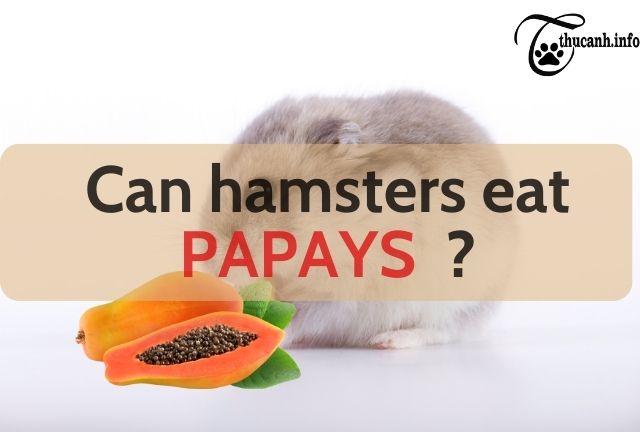Can Hamsters Eat Papaya? Hamsters are small, adorable pets that bring joy to many pet owners around the world. As a responsible pet owner, you want to make sure your hamster has a balanced and healthy diet. With so many fruits available, it can be challenging to know what’s safe for your furry friend. One fruit that may come to mind is papaya.
In this guide, we’ll explore whether or not hamsters can eat papaya and provide some additional information about this tropical fruit.

Can hamsters eat fresh papaya?
1, Can Hamsters Eat Papaya?
Yes, hamsters can eat papaya but only in moderation. Papaya is safe for hamsters because it’s low in sugar, fat, and calories, making it an excellent addition to their diet. However, it’s important to note that too much of any fruit can upset a hamster’s stomach.
2, Understanding the Nutritional Benefits of Papaya for Hamsters
Papaya is not only a delicious tropical fruit for humans but also offers various nutritional benefits for hamsters. It is important to understand the positive effects of papaya on hamsters’ health to ensure their well-being.
2.1, Exploring the Nutritional Composition of Papaya and Its Positive Effects on Hamsters’ Health
Papaya is rich in essential nutrients that can contribute to the overall health of hamsters. It contains vitamins such as vitamin C and A, antioxidants like beta-carotene, and dietary fiber. These components support hamsters’ immune system, improve eye health, and aid in digestion.
2.2, Highlighting the Vitamins, Antioxidants, and Fiber Content in Papaya that Promote Well-being
The vitamins present in papaya, particularly vitamin C, play a crucial role in maintaining the health and vitality of hamsters. Antioxidants help protect their cells from damage caused by free radicals, while the fiber content promotes proper digestion and prevents constipation.
3, Feeding Papaya to Hamsters: Guidelines and Considerations

Papaya and hamsters
When offering papaya to hamsters, it is important to follow specific guidelines and considerations. While papaya can be beneficial, it should be given in moderation and with care.
3.1, Introducing Papaya Gradually and Monitoring Hamsters’ Digestive Response
To introduce papaya to hamsters, start with small portions and observe their digestive response. Some hamsters may be more sensitive, so it’s important to monitor any signs of discomfort or digestive issues. If any adverse reactions occur, it is best to discontinue feeding papaya.
3.2, Determining Suitable Portion Sizes and Frequency of Offering Papaya to Different Hamster Species
The appropriate portion sizes and frequency of feeding papaya may vary depending on the hamster species. Larger species like Syrian hamsters can be given small pieces of papaya once or twice a week, while smaller species like dwarf hamsters should avoid papaya due to potential digestive issues.
Overall, understanding the nutritional benefits of papaya for hamsters and following proper guidelines can ensure their health and well-being. As with any dietary changes, it’s essential to monitor your hamster’s response and consult with a veterinarian if needed.
4, Alternatives to Papaya for a Balanced Hamster Diet

Is papaya good for hamsters?
While papaya can be a beneficial addition to a hamster’s diet, it’s essential to consider alternative options to ensure a balanced and nutritious meal plan for your furry friend.
4.1, Exploring Other Safe and Nutritious Fruits and Vegetables for Hamsters
There are several other fruits and vegetables that are safe and nutritious for hamsters. These include options such as apples, bananas, carrots, cucumbers, and leafy greens like spinach. These alternatives provide a variety of vitamins, minerals, and fiber to support hamsters’ overall health.
4.2, Providing a Variety of Options to Ensure a Well-rounded Diet for Optimal Hamster Health
To maintain optimal health, it is crucial to offer a diverse range of food options to hamsters. By incorporating different fruits, vegetables, and even occasional treats, you can provide a well-rounded diet that meets their nutritional needs. This variety not only ensures proper nourishment but also adds enrichment to their feeding routine.
By diversifying their diet, you can provide essential nutrients and prevent any potential deficiencies. Remember to introduce new foods gradually and monitor your hamster’s response to ensure their well-being.
Offering a selection of safe and nutritious alternatives to papaya will help keep your hamster’s diet balanced, enjoyable, and supportive of their overall health. Remember to consult with a veterinarian for specific dietary recommendations based on your hamster’s species and individual needs.
Fruits to Avoid Giving Your Hamster
- Not all fruits are safe for hamsters to eat. Here are some fruits to avoid feeding your furry friend:
- Citrus fruits (oranges, lemons, limes, grapefruits)
- Grapes
- Cherries (contain cyanide)
- Rhubarb (leaves are toxic)
- Avocado (contains persin)
5, FAQs
- Is papaya safe for hamsters? Yes, papaya is safe for hamsters, but only in moderation. Too much papaya can cause digestive issues.
- What are the nutritional benefits of papaya for hamsters? Papaya contains vitamin C, fiber, and antioxidants that can benefit your hamster’s health.
- Can hamsters eat other fruits besides papaya? Yes, there are many fruits safe for hamsters such as apples, bananas (in moderation), blueberries, mango, and strawberries.
- What are some fruits to avoid feeding my hamster? Avoid giving your hamster citrus fruits, grapes, cherries, rhubarb (leaves are toxic), and avocado (contains persin).
- How much papaya can I give my hamster? A small piece of papaya once a week is enough for your hamster to enjoy the nutritional benefits without causing any harm.
According to THUCANH, can hamsters eat papaya? Yes, they can, but only in moderation. Papaya is low in sugar, fat, and calories, making it a great addition to your hamster’s diet. However, too much papaya can cause digestive issues, so it’s essential to feed it sparingly. Remember to always provide fresh water, hay, and pellets and consult with your veterinarian if you have any concerns about your hamster’s diet.


